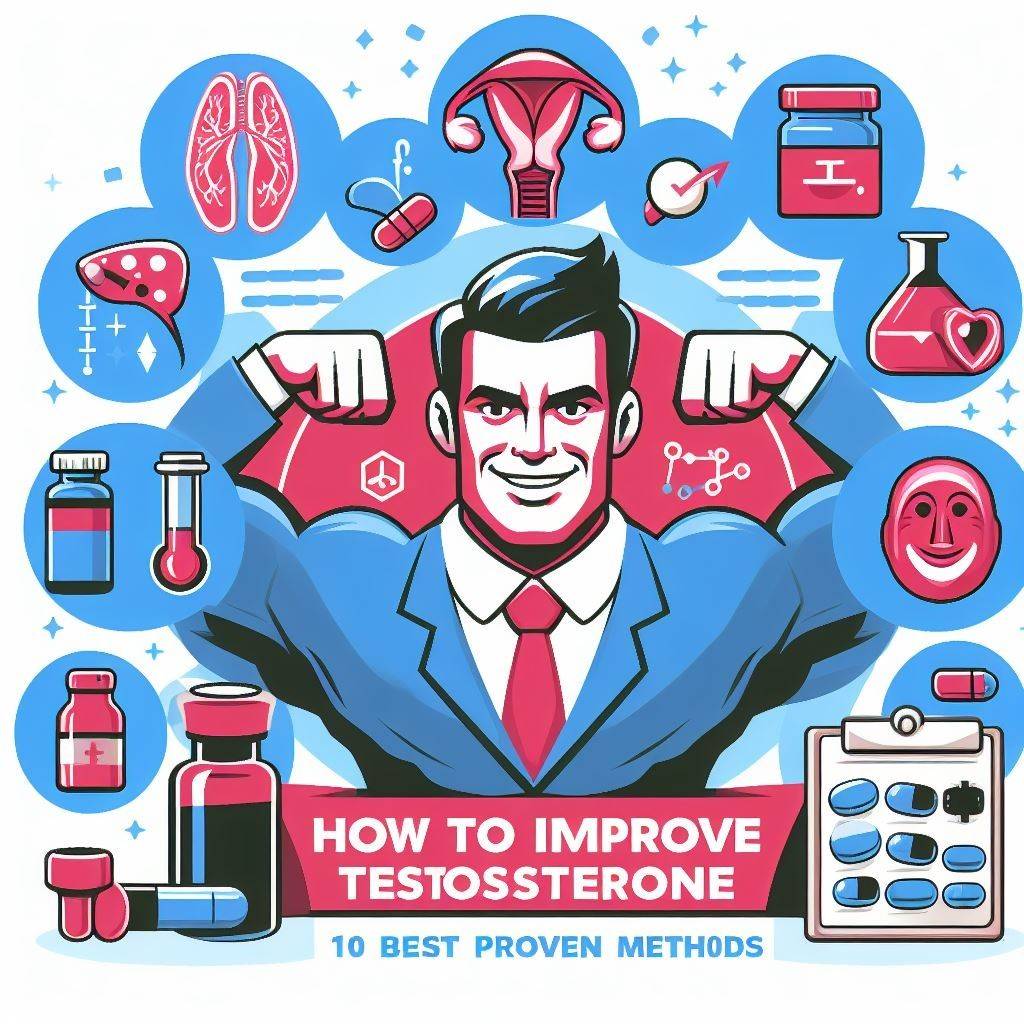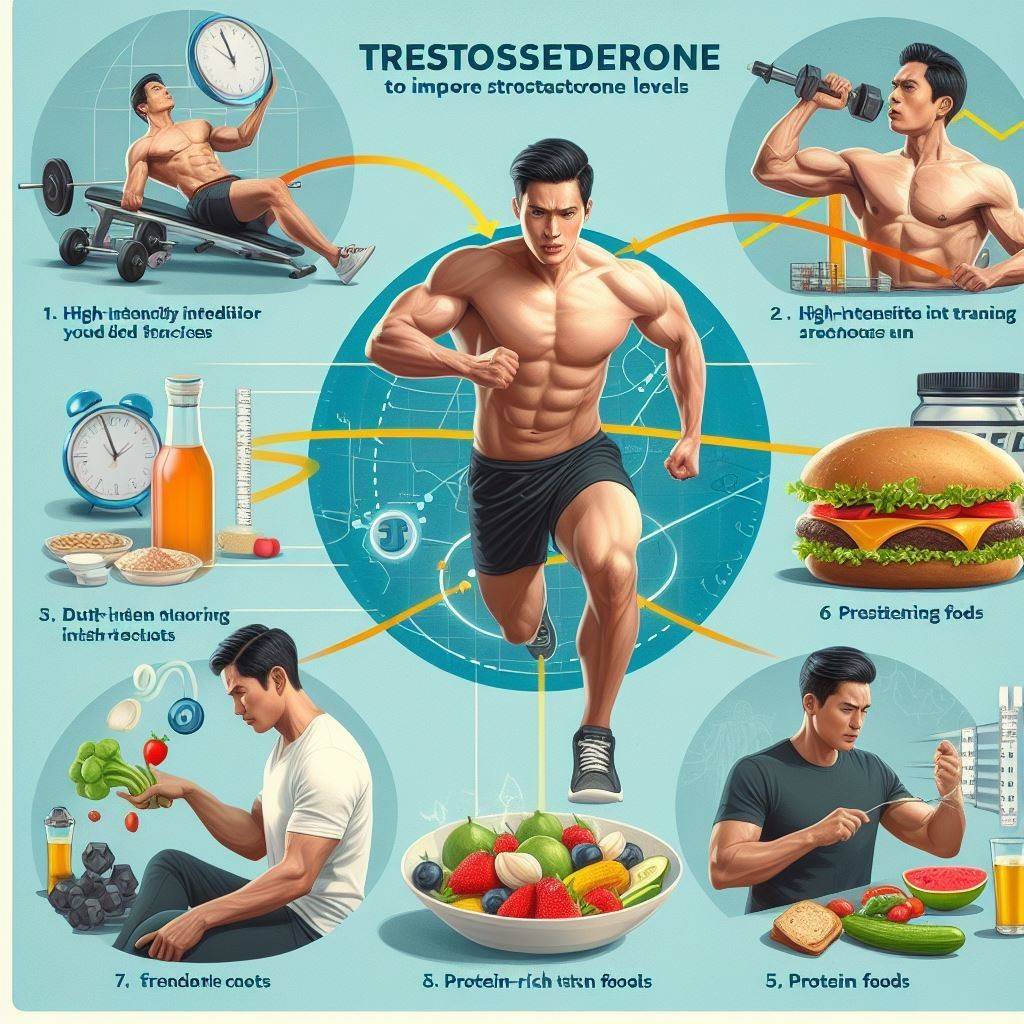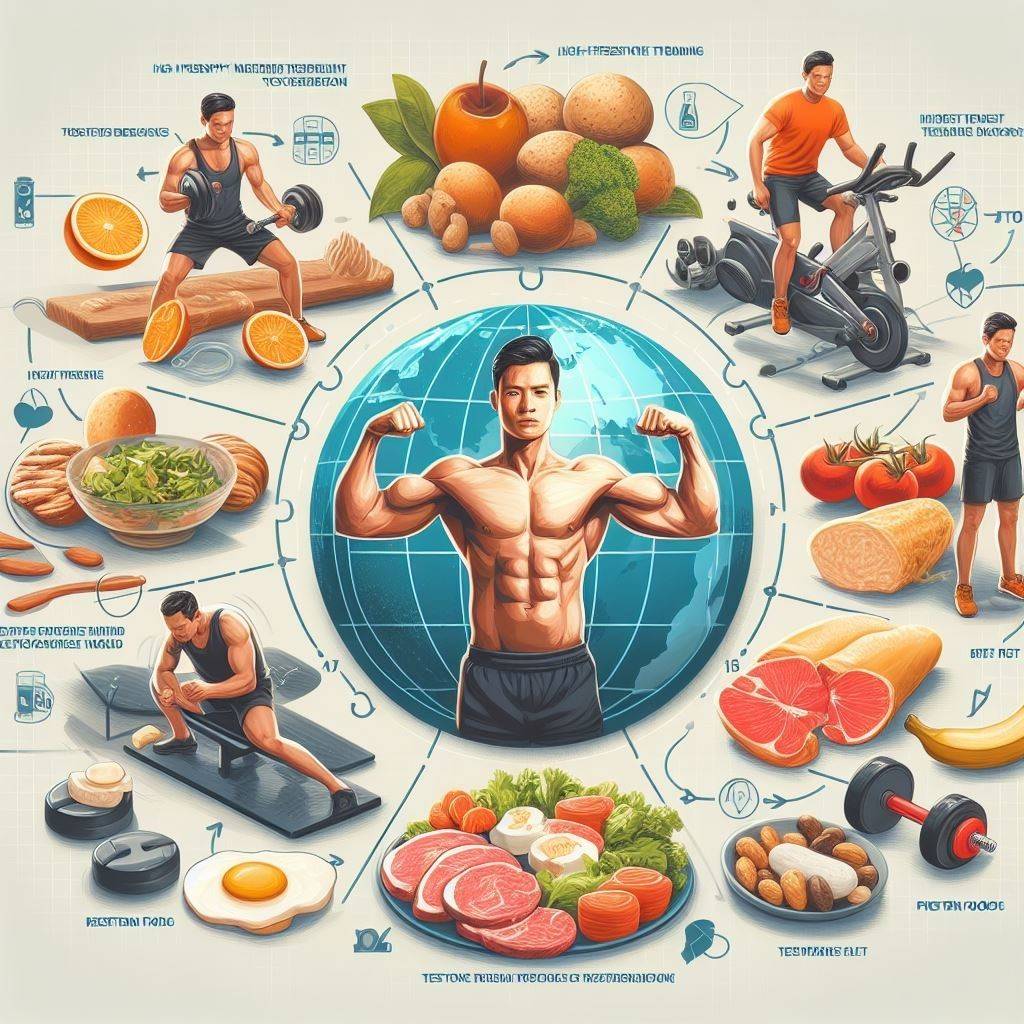How to Improve Testosterone: 10 Best Proven Methods
Discover the ultimate guide on How to Improve Testosterone with our 10 proven methods. Boost energy, vitality, and strength naturally for peak male wellness.
Introduction
Having optimal levels of testosterone is crucial for men’s health and vitality. Knowing how to improve testosterone naturally through lifestyle changes and nutrition is important as testosterone levels decline with age.
This comprehensive guide will cover the top 10 science-backed methods proven to increase testosterone and improve masculinity. By implementing just a few of these testosterone-boosting techniques, you can optimize this key hormone and enhance your overall vitality.
Key Takeaways on How to Improve Testosterone:

- Lift weights with compound exercises
- Perform High-Intensity Interval Training (HIIT)
- Try intermittent fasting.
- Take supplements like vitamin D, zinc, and magnesium.
- Reduce stress through meditation, nature, and massages.
- Get 7-9 hours of quality sleep per night.
- Lose weight if overweight or obese.
- Limit alcohol intake
- Eat testosterone-friendly foods.
- Consider testosterone replacement therapy if deficient.
How to Improve Testosterone with 10 Proven Methods

Now let’s explore each of these natural testosterone-boosting methods in detail.
1. Strength Train with Compound Lifts
Lifting weights is one of the most effective ways to increase testosterone levels. However, research shows that focusing your training on compound exercises, like squats and deadlifts, produces greater testosterone gains compared to isolation exercises. Learn How to Improve Testosterone with these proven methods, enhancing energy, vitality, and strength naturally for peak male wellness.
Compound exercises involve working multiple large muscle groups at the same time. Examples include moves like:
- Squats
- Deadlifts
- Bench Press
- Overhead Shoulder Press
- Bent Over Rows
- Pull Ups
- Dips
These multi-joint lifts challenge your body more intensely than single-joint isolation moves. Your body responds by ramping up testosterone production to aid muscle and strength building.
Aim to strength train at least 2-4 days per week, centring your workouts around compound exercises targeting all the major muscle groups. This strategy provides maximum testosterone-enhancing benefits.
2. Try High-Intensity Interval Training
In addition to strength training, How to Improve Testosterone? High-intensity interval Training (HIIT) offers a fast, efficient workout method shown to spike testosterone. Incorporate these strategies into your routine for natural enhancements in energy, vitality, and strength.
HIIT involves short, intense bursts of maximum-effort exercise followed by brief rest periods. This type of training increases testosterone and growth hormone more than steady-state cardio.
Some examples of effective HIIT workouts include:
- Sprinting on a treadmill or outside for 30 seconds, then walking for 1-2 minutes. Repeat for 15-20 total minutes.
- Jump rope at maximum speed for 30 seconds, resting for 1 minute. Repeat.
- Circuit training moves rapidly between bodyweight exercises with minimal rest between sets.
Aim for 2-3 HIIT sessions per week. Be careful not to overdo HIIT, as too much can negatively impact testosterone. Balance it with adequate strength training and rest.
3. Incorporate Intermittent Fasting
Intermittent fasting (IF) is an eating pattern that research shows can increase testosterone levels, especially when paired with exercise.
With IF, you condense your normal daily calories into a shortened “feeding window,” such as 8 hours or less. For example, skipping breakfast and only eating from 12 pm until 8 pm daily.
Studies demonstrate IF can optimize testosterone by improving insulin sensitivity, increasing HGH, and regulating testosterone production rhythms.
Start with a daily 16-hour fast combined with an 8-hour feeding window. Drink plenty of water during fasts. Consider working with a nutritionist to ensure sufficient calories and nutrients when condensing eating into a smaller window.
4. Take Key Testosterone Supplements
Certain vitamins, minerals, and herbs have been clinically shown to help support healthy testosterone levels. The best testosterone-boosting supplements include:
Vitamin D
- Vitamin D is essential for hormone balance and testosterone production.
- Get regular sun exposure and take 2000-5000 IU of D3 daily.
- Studies confirm men low in vitamin D typically have lower testosterone.
Zinc
- Zinc is critical for testosterone production. The tests require high zinc to synthesize testosterone.
- Take 30-45mg of zinc gluconate daily. Too much zinc can be harmful, so stick to this dosage.
Magnesium
- Increasing magnesium intake can help elevate free testosterone levels by reducing inflammation and improving sleep quality.
- Take 200-400mg of magnesium glycinate or citrate before bedtime.
Take vitamin D and zinc together for the best results. Getting enough of these key micronutrients supports healthy testosterone synthesis.
5. Manage Stress Levels
When you’re under constant stress and have high cortisol, your testosterone production plummets. Cortisol is the “stress hormone” released by the adrenal glands in response to stress. It signals your body to produce less testosterone.
Making lifestyle changes to control cortisol is crucial for maintaining peak testosterone levels and overall health. Proven stress-reducing strategies include:
- Meditation – Just 10-20 minutes of meditation daily can dramatically lower cortisol and anxiety. Try focused attention meditation to reduce stress.
- Spending Time in Nature – Being outdoors, disconnected from work and devices, reliably lowers cortisol. Hike, walk on the beach, relax in nature to calm stress.
- Getting Massages – Weekly 60–90-minute massages can reduce cortisol while boosting relaxation. Aim for professional massages when possible.
By counteracting chronic stress, you’ll reap the testosterone-enhancing benefits.
6. Prioritize High-Quality Sleep
Not getting enough sleep disrupts hormone balance and impedes testosterone production. During deep sleep, the pituitary gland releases essential hormones like growth hormones that facilitate healthy testosterone levels.
Follow proper sleep hygiene habits:
- Stick to consistent bed and wake times, even on weekends.
- Optimize your sleep environment – cool, completely dark, and distraction-free.
- Avoid screen time in the two hours before bed.
- Reduce caffeine intake, especially after 2 pm
- Try magnesium supplements which may support deeper sleep
Aim for 7-9 hours of quality sleep per night to support optimal testosterone production.
7. Lose Weight If Overfat
When men carry excess body fat – especially abdominal visceral fat – it triggers hormonal changes that tank testosterone levels. How to Improve Testosterone? The enzymes in fat tissue convert testosterone into estrogen, reducing T levels. Learn to optimize your weight for enhanced energy, vitality, and strength naturally.
If significantly overweight or obese:
- Aim to get under 25% body fat through diet and increased activity. Focus on body composition rather than the number on the scale.
- Incorporate 2-3 days per week of strength training to build muscle, which increases metabolism to help burn fat.
- Add in cardio that gets your heart rate up, like jogging, swimming, hiking, and biking.
- Cut out refined carbs, added sugar, sugary drinks, and processed foods which spike blood sugar and insulin.
As you lose fat and gain muscle, your testosterone will rise.
8. Avoid Environmental Toxins
Exposure to certain toxins and chemicals in our modern environment can disrupt hormones like testosterone. Avoiding these environmental toxins can help optimize T levels.
Some steps to minimize exposure include:
- Eat organic produce to reduce pesticide intake from non-organic foods. Pesticides have endocrine-disrupting effects.
- Avoid using plastic food containers and plastic water bottles, which can leach chemicals like BPA. Use glass or stainless-steel containers.
- Be aware of toxins in personal care and cleaning products. Choose more natural and organic products free of parabens, phthalates, and other chemicals.
- Reduce intake of large fish high on the food chain which accumulates mercury, such as tuna. Limit tuna to 6 ounces per week.
- If possible, filter your home’s water to remove potential contaminants and drink filtered or bottled water.
- Improve indoor air quality by ventilating rooms and using air purifiers to reduce toxins.
Reducing exposure to hormones disrupting toxins in your diet, environment, and products can help support healthy testosterone synthesis.
9. Eat Testosterone-Friendly Foods
You can help optimize testosterone levels through your diet. How to Improve Testosterone? There are certain foods containing beneficial nutrients and compounds that support healthy testosterone synthesis. Incorporate these dietary changes for a natural boost in energy, vitality, and strength.
Some top testosterone-boosting foods to eat more of include:
- Oysters and shellfish – Rich sources of zinc and vitamin D
- Sweet potatoes – contain precursor nutrients that help produce testosterone.
- Grass-fed beef – High in zinc, magnesium, and saturated fats
- Nuts like almonds, walnuts, and Brazil nuts are great sources of magnesium, zinc, and healthy fats
- Olive oil – Provides anti-inflammatory monounsaturated fats
- Cruciferous veggies – Broccoli, cabbage, kale, and cauliflower contain indoles that regulate estrogen
Building your nutrition plan around these testosterone-supporting foods provides the building blocks needed for optimal T production.
10. Consider Testosterone Replacement Therapy
If you have chronically low testosterone along with symptoms like erectile dysfunction, low libido, and depression, testosterone replacement therapy (TRT) may be an option under the care of a hormone specialist.
TRT involves restoring testosterone levels to a healthy range using bioidentical forms of the hormone. Benefits may include:
- Increased energy, sex drive, and erectile function
- Growth of lean muscle mass when combined with strength training.
- Improved mood, motivation, and cognitive ability
- Reduced risk factors for cardiovascular disease
- Increased bone mineral density and lowered fracture risk
There are minor risks like elevated hematocrit levels to monitor. Work closely with an endocrinologist to determine if TRT is appropriate for your hormonal status and health history.
In summary, there are several proven methods to naturally boost testosterone through diet, exercise, stress management, targeted supplementation, and medication if needed. How to Improve Testosterone? Focus on implementing 2-3 testosterone-boosting techniques at a time, and retest T levels after 6 weeks to track improvements. Enhance your energy, vitality, and strength for peak male wellness.
With consistency, you can increase this vital hormone, enhance masculinity and sexual function, support muscle growth, and optimize overall health as you age. Follow these evidence-based tips for how to improve testosterone levels safely and effectively.
Conclusion
In summary, there are several effective ways how to improve testosterone through diet, exercise, stress management, targeted supplementation, and medication if needed. Focus on implementing 2-3 testosterone-boosting methods at a time, and retest T levels after 6 weeks to track improvements.
With consistency, you can increase this vital hormone, boost masculinity and sexual function, support muscle growth, and enhance overall health. Follow these proven techniques for how to improve testosterone levels naturally and safely.



